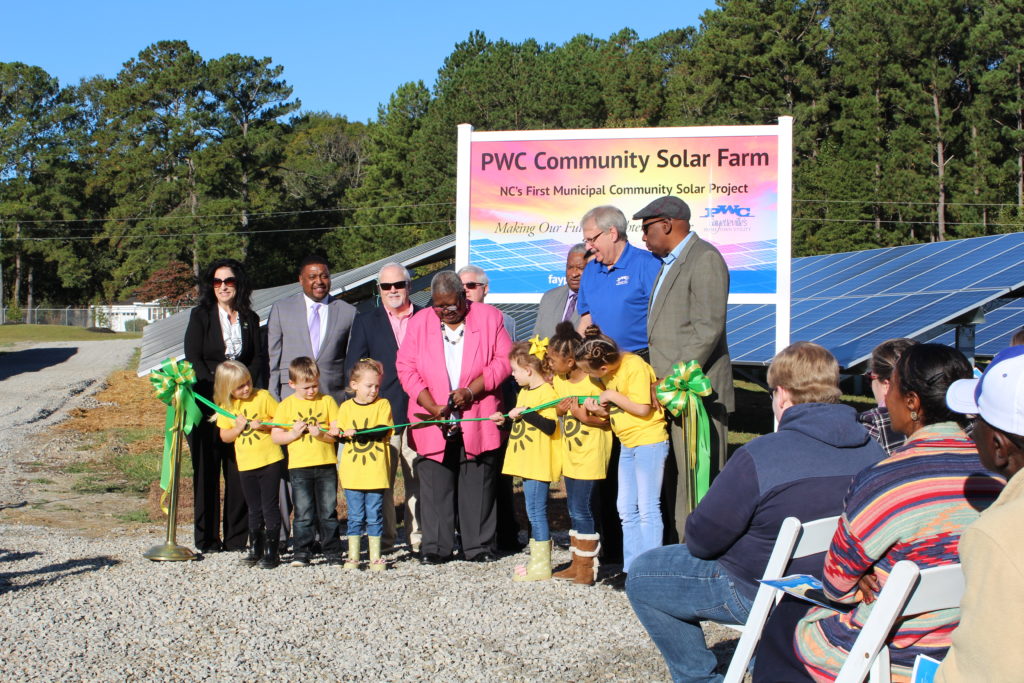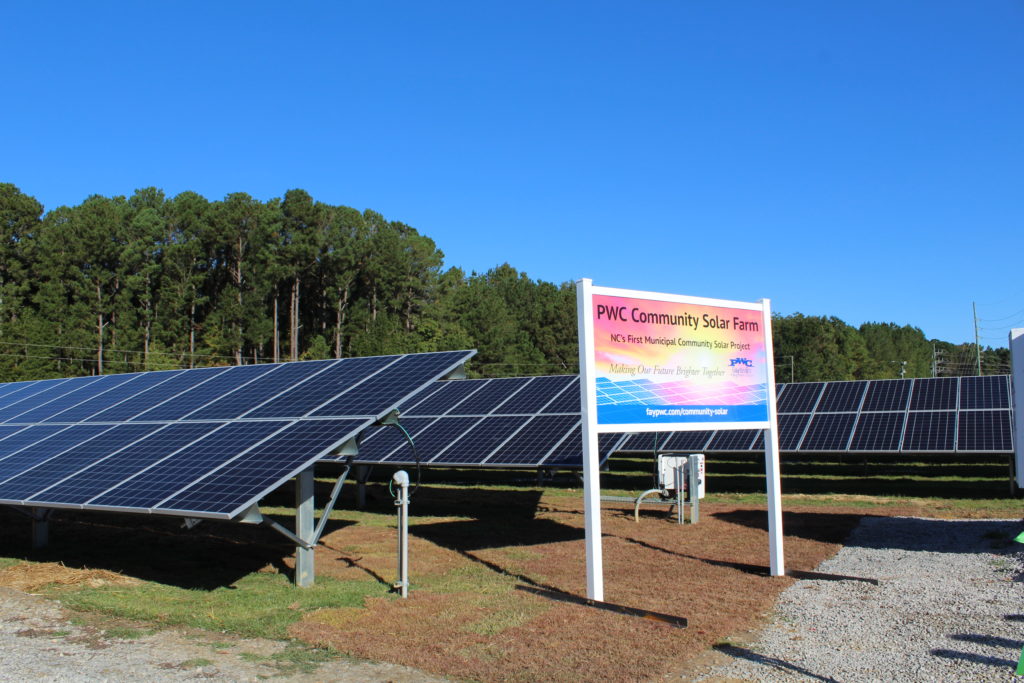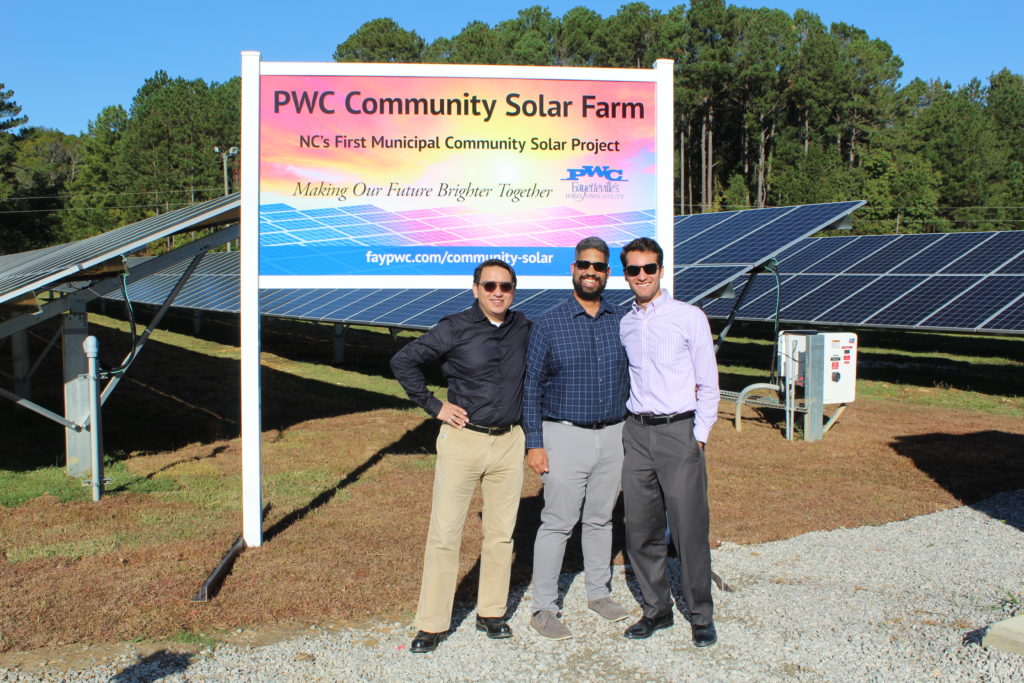Fayetteville Public Works Commission’s Community Solar Farm the First Municipal Community Solar Farm in North Carolina

Surrounded by 3,400 solar panels, a crowd gathered on Oct. 23 for Fayetteville Public Works Commission’s unveiling of its brand new community solar farm at the Butler-Warner Generation Plant in Fayetteville, NC.
“This is a very special day, and a very special place for us,” said David Trego, Fayetteville PWC CEO/General Manager, before the ribbon was cut.
Fayetteville’s 1 megawatt solar farm is the first municipal utility community solar project in North Carolina. The new large-scale, ground-mount solar array will offer electric customers a shared renewable energy option and an alternate to rooftop solar. Customers can enroll in the Community Solar Program, pay a monthly subscription fee, and in exchange, receive a bill credit for the value of the solar less the cost to operate. All electric customers – whether owning or renting and whether residential or non-residential – can participate as a ‘subscriber’ in the program. Fayetteville, NC customers can enroll in the program beginning November 1.
“Community solar is an opportunity for Fayetteville customers to benefit from renewable energy without the risk, including the operation and maintenance costs often associated with rooftop solar systems,” said Kimberly Conley, North Carolina Clean Energy Technology Center (NCCETC) Senior Project Manager. “The community solar model allows customers to invest directly in the future of solar energy as a more sustainable option, long-term.”
NCCETC provided a technical and economic analysis for the community solar project, including a 560 kW battery, to help the municipal utility consider the viability, costs, and value of the renewable energy in an effort to diversify their generation portfolio. Through an extensive RFQ process, PWC chose design-build firm Dewberry, to build the project.
The Fayetteville PWC Community Solar project became the pilot to serve as a model for other municipal and cooperative electric utilities to develop similar programs for their communities as part of the US Department of Energy Community Solar in the Southeast project. NCCETC’s Community Solar for the Southeast project aims to accelerate the installation of community solar photovoltaic (PV) systems at municipal and cooperative electric utilities across the Southeast. Energy engineers and policy analysts developed an economic analysis which included, i) system selection, ii) battery dispatch optimization, and iii) community solar program guidance. Additionally, the NCCETC helped prepare a Request for Qualifications (RFQ) according to PWC’s procurement policy to help identify project developers local to the utility’s footprint. The Municipal Utility Case Study shared with the U.S. DOE can be found here.
“NCCETC was instrumental in providing the system selection and cost/benefit analysis,” said Kathy Miller, Marketing Manager at Fayetteville PWC. “The analysis included an hourly production and economic model incorporating monthly coincident peaks, ambient temperature, and solar radiation since 2009. NCCETC developed the RFQ for the solar/battery installation and continued to assist PWC as we evaluated various program options.”
Fayetteville PWC provides electric service to more than 87,000 customers in the Fayetteville/Cumberland County area of North Carolina, is the largest public power provider in the state, and is the 35th largest in the United States. It is the only municipal that owns its generation plant, and has been in operation for almost 30 years. The new solar array is sited on six acres by the Butler-Warner Generation Plant at 2274 Custer Ave., and is estimated to cost about $2.7 million.

Fayetteville is also the first community solar project in the state to have solar directly coupled with a battery.
The addition of the 560 kW lithium-ion battery will allow the utility to store 1,120 kilowatt hours of electricity. PWC can use power from the battery during peak demand times, such as on hot days when buying wholesale power from Duke Energy is the most expensive.
“That will allow us to use the sun to charge the batteries and discharge those batteries when we have our peak usage times, saving all of our customers money,” Trego said.
“Battery storage increases the value of the project exponentially,” said Ted Spencer, Engineering Extension Specialist with NCCETC. Spencer has been comparing solar output and construction costs of the original design against actual costs, which were closely aligned.
Fayetteville PWC said the Commission decided to complete the community solar project because they wanted to provide an affordable solar option to customers, and doing so also helps them meet the Senate Bill 3 Renewable Energy Portfolio mandate which requires municipal utilities’ to generate 10 percent from renewable sources.
Community solar seemed fitting for Fayetteville as 48 percent of its customers are renters, and a recent survey indicated that 52 percent of customers have lived in their home less than five years.
“For these customers, rooftop solar is not an option,” Miller said. “Community solar can be installed on a well-suited site that gets the most out of the sun’s potential. It is a hassle-free, low cost way for customers to receive the benefit of clean power.”
“We have a very transient community and a large number of renters who may be interested in solar, but rooftop solar isn’t feasible,” Carolyn Justice-Hinson of Fayetteville PWC said.
Prior to starting the project, Fayetteville PWC surveyed customers and had a favorable response with almost 800 requesting additional information about the program.
“A recent survey indicated that 25.3 percent of customers are environmentally conscious ‘Green Champions’ – these are the customers we expect will sign up for community solar,” Miller said.
Fayetteville PWC expects to offer a five-panel maximum subscription, Miller said. There is an initial enrollment fee of $20 for the first panel and $10 for each additional panel, up to five panels. The monthly subscription fee is $1.53 per panel and the monthly bill credit is $2.51. The bill credit will be adjusted each year to reflect the value of production less the cost to operate. The average residential PWC customer uses 1,017 kWh of electricity each month, Miller said. Five solar panels will produce an average of 196 kWh per month; therefore, solar production will offset 19 percent of the energy consumed by the home.

The N.C. Weatherization Assistance Program (NCWAP) recently awarded grant funds of $128,000 to three organizations that will provide community solar resources for qualified low-income residents – and Fayetteville PWC was included. NCWAP is providing $3,200 per home. Fayetteville PWC will use the funding to support the participation of 10 eligible households in their PWC Community Solar Weatherization Pilot project, according to a press release. Fayetteville’s model operates as a prepaid subscription with accrued interest over the project life to further support the project.
Also present at the ribbon-cutting ceremony were Fayetteville Mayor Mitch Colvin and several members of Cumberland County’s Board of Commissioners.
“We have long had a strategic goal at the board of commissioners for long-term sustainable growth, community growth and economic development. Being first in a project such as this in the state should make all of us very proud,” said Evelyn Shaw, chair of PWC’s Board of Commissioners.
“It’s an honor and privilege to be here today to show not only PWC’s commitment – but the city of Fayetteville’s commitment – to sustainability, clean energy and cutting-edge technology,” said Fayetteville Mayor Mitch Colvin. “This is a great day in the city of Fayetteville.”
Holding the ribbon were several children and grandchildren of PWC employees dressed in bright yellow shirts with suns on them.
“This is about the future. It’s long term sustainability,” Trego said. “While our current customers will enjoy the benefits of this, it is our children who will truly have the benefit of a project like this in the long-run.”
As part of the Community Solar for the Southeast funding, an additional four communities are currently receiving technical assistance from the NCCETC to discern viability for community solar installations. Visit https://nccleantech.ncsu.edu/our-work/policy/community-solar-for-the-southeast-project/ for a comprehensive list of resources surrounding this project.
Learn more about Fayetteville’s Community Solar and how to enroll at https://www.faypwc.com/community-solar/.
About the Community Solar for the Southeast project
The Community Solar for the Southeast project aims to make solar more affordable and accessible through shared solar projects developed by cooperatives and municipal utilities across the southeast. The project aims to lead stakeholder process with rural public power utilities to determine solutions needed to increase development of community solar project. The team will provide technical assistance to analyze, design, and implement community solar projects.
The project is led by the North Carolina Clean Energy Technology Center with partners including Rocky Mountain Institute, Fayetteville Public Works Commission, NC Justice Center, National Rural Electric Cooperative Association, Roanoke Electric, Strata Solar, EcoPlexus, Geenex, and GreenLink. The project is funded by the Department of Energy SunShot program under Solar Energy Evolution and Diffusion Studies-2-State Energy Strategies (SEED2-SES).